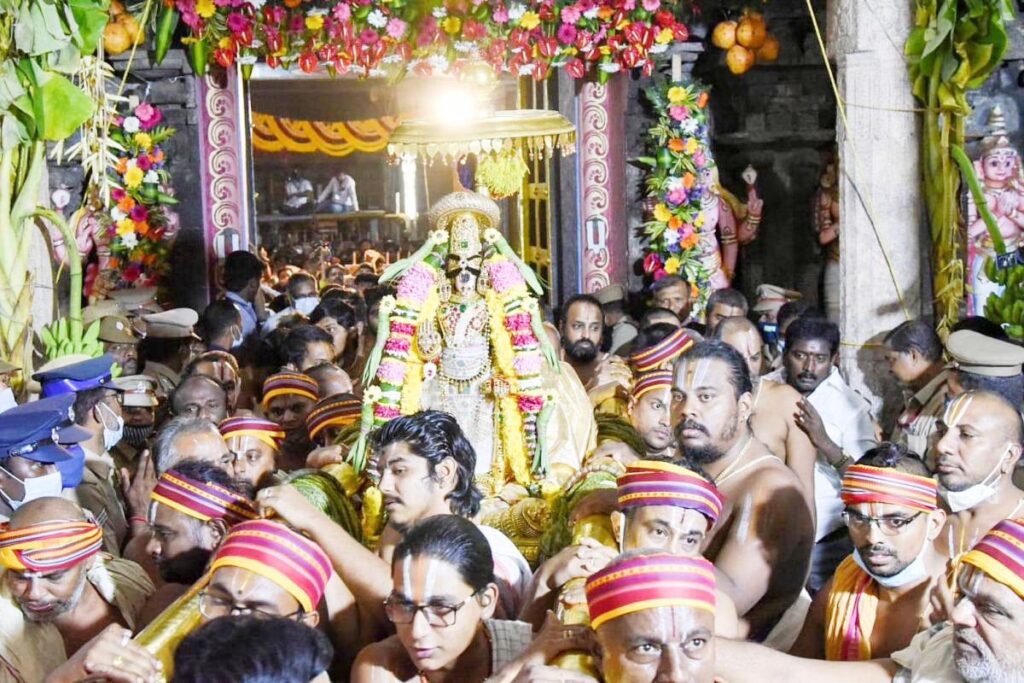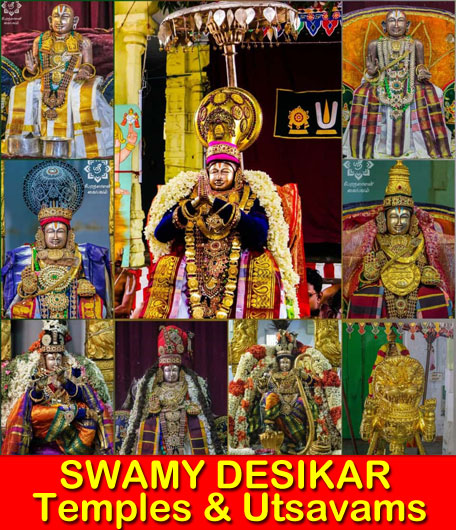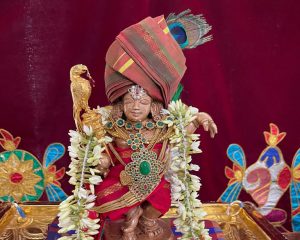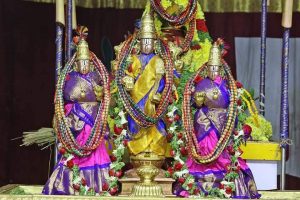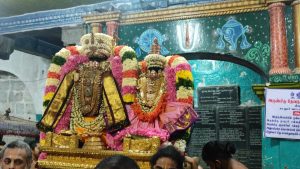Vaikunta Ekadashi is treated as a special Ekadasi, as it coincides with Moksada Ekadasi or Putrada Ekadasi. What is its significance? It is observed on the 11th lunar day of the waxing lunar fortnight of the solar month of Dhanu, which falls between 16 December and 13 January every year. The Vaishnavites, worshipers and followers of Maha Vishnu sect believes that ‘Vaikunta Dwaram’ or ‘the gate to the Lord’s Inner Sanctum’ is opened on this day. The Margashirsha Shukla Paksha Ekadashi in the lunar calendar is known as a ‘Mokshada Ekadashi.’ Special prayers from Vedas, Divya Prabhandham, Sri Vaikuntha Gadhyam and additional Gadhyams by Ramanuja are chanted.
Vaikuntha Dwara Pooja, Prakarothsvam (Sri Veli), Oonjal Seva (swing pooja), Oonjal Prabhandham, yagnas, discourses and speeches are arranged at Vishnu temples around the world on this auspicious day. Vaikuntha is the Supreme Abode of Lord Vishnu and called the place of non-hindrance. Mortals find it in the feet of Vishnu as Vishnupada, or Param Padam, as it is a place for him and his devotees to reside in the suddha-sattva, or the supreme state of purity and goodness.
In Vishnu temples, Vaikuntha Ekadashi is part and parcel of Dhanurmaasa (Margazhi) Vratham and Pooja. Entire month is Vratha month as all days of Dhanurmaasa require control over actions and food restrictions for SriVaishnavas. The Shaiva sect observes the day as Trikoti Ekadashi, a religious observance where all the deities in the Hindu Pantheon pay obeisance to Lord Sri Shiva at once.
According to Vishnu Purana, observing fast on Vaikuntha Ekadashi is equivalent to fasting on the remaining 23 Ekadashis of the year. According to Vaishnava tradition, fasting is mandatory on all Ekadashis of both Shukla Paksha and Krishna Paksha, as it is considered holier than any other religious observation. Complete fasting has to be observed on Ekadashi, the 11th day of the Paksha. The meal on Dwadashi, i.e. on the 12th Day is designed to be wholesome, nutritious, and filling.
Lord Vishnu opened the gate of Vaikuntham (his abode) for two asuras (demons) in spite of their confrontation with him. They also asked for the boon that whoever listens to their story and sees the image of Vishnu coming out of the door called Vaikunth Dwar, will reach Vaikunth as well. Temples all over India make a door kind of structure on this day for devotees to walk through. According to Padma Purana, the female energy of Vishnu slayed the demon Muran and protects the ‘Devas’. This happened on the eleventh day of lunar month during the sun’s journey in the Dhanu Rashi. Impressed by the act, Vishnu names her as ‘Ekadashi’ and gives her the boon that those who worship ‘Ekadashi’ on the day of her victory over Muran would reach Vaikunth.
Vaikuntha Ekadashi is an auspicious occasion for the people belonging to the Hindu community. It is dedicated to Vishnu. It bestows liberation from the cycle of birth and death. The significance of Vaikuntha Ekadashi is mentioned in the Padma Purana. The legend says that the Devas, unable to bear the tyranny of ‘Muran’ – a demon, approached Shiva, who directed them to Vishnu. A battle ensued between Vishnu and the demon and the god realised that a new weapon was needed to slay Muran. In order to take rest and create a new weapon, Vishnu retired to a cave for the goddess named Haimavati in Badarikashrama.
When Muran tried to slay Vishnu when he was fast asleep, the female power that emerged from him burned Muran to ashes with her glance. Vishnu, who was pleased with her effort and sincerity, named the goddess “Ekadashi” and asked her to claim a boon. Ekadashi, instead, beseeched the reverred Lord that people who observed a fast on that day should be redeemed of their sins. Vishnu thus declared that people, who observed a fast on that day and worshipped Ekadashi, would attain Vaikuntha. Thus came into being the first Ekadashi, which was a Dhanurmasa Shukla Paksha Ekadashi.
The demon Muran had advocated for lust, passion, inertia and arrogance. When the people shun aside such bad practices they are expected to attain the purity of mind before being provided with moksha, i.e. the liberation or realisation of the self. Fasting helps to keep at bay tendencies which could be triggered by intake of certain foods. Keeping vigil in the night is symbolic of awareness, or being watchful of the contents of the mind. The belief that rice is prohibited, because Muran dwells in it, symbolically signifies that the eating of rice makes one feel heavy and hampers the vigil. This signifies that entertaining negative tendencies could hamper one’s progress towards awareness or consciousness. It is reported in the ‘Mahabharata’ and ‘Bhagavad Gita’ that the conversation between Krishna and Arjuna at the beginning of Kurukeshetra war is reported to have occurred on this day.
Special prayers are offered to Vishnu, who is also reverred in the name of “Thirumal” and devotees engage in chanting of Vishnu’s name and Dhyana (Meditation), on ‘Dashami’, the previous day of the observance. On the Vaikunta Ekadasi, the devotees are expected to visit the temple of Vishnu, invariably in the wee hours of the morning.On this day, the Vaikuntha Dwaram or the Vaikuntha Vaasal, ‘The Gates of Vaikunta’ are believed to be kept open. The area encircling the sanctum is referred to Vaikuntha Vaasal and devotees throng to gain entry into the temple, to seek the blessings of Vishnu.
At Ranganatha Swamy temple in Srirangam, Vaikuntha Ekadashi celebrations would last for 20 days, divided into two parts: Pagal Pathu (morning part 10 days) and Ira Pathu (night part 10 days). It is being believed that Vishnu as Lord Ranganatha Moolavar will bless devotees in ‘Muthangi’ (an armour of Pearls) on all 20 days. On the 10th day of Pagal Pathu (previous day of Vaikuntha Ekadashi) Utsavar Namperumal will bless devotees in Mohini Alankaram. On Vaikuntha Ekadashi in the early morning, Utsavar Namperumal will bless devotees in Rathnaangi, (an armour of diamonds and gems) and brought to the Thousand-Pillared Hall from the sanctum sanctorum through the northern gate known as Paramapada Vasal, the gate to Vaikuntha. This gate is opened once in a year, only on the Vaikuntha Ekadashi day. On the eighth day of Irapathu, Namperumal will bless devotees in Golden Horse Vahanam in the evening and subsequently, Thirumangai Mannan Vedupari ritual will be held.
The Lord Venkateswara temple at Tirumala-Tirupati also has a similar concept to celebrate Mukkoti Ekadashi, as it is known in the Telugu-speaking regions. Tirumala has a special entrance called Vaikuntha Dwaram (passage) that encircles the sanctum sanctorum. The dwaram is opened only on Vaikuntha Ekadashi and it is believed that any person who passes through this `Vaikuntha Dwaram’ on this particular day attains salvation. The temple witnesses array of pilgrims and dignitaries for Vaikuntha Ekadashi. All Arjitha sevas are cancelled on this day, including VIP darshan and only Sarva Darshanam is allowed except for VVIP’s. Vaikunta Ekadasi has proved to be a blessing-in-disguise for the devotees every year.
K.V. Venugopal


